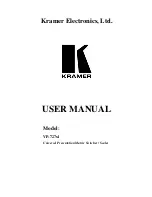
Chapter 2
Using the SCXI-1129
2-4
ni.com
4
××××
16 Matrix Configuration
Figure 2-3 shows an example of the SCXI-1129 configured as a 4
×
16,
2-wire matrix. In the 4
×
16 matrix configuration, you have independent
access to four, 4
×
16 matrixes. The diagram shows connections for a
general test setup that connects both instruments and devices under test
(DUTs) to columns while using rows as connection points. You can create
other terminal block configurations by connecting rows/columns of the
basic configuration.
Figure 2-3.
4
×
16 Matrix Test Setup Example
Figure 2-4 is the block diagram of the SCXI-1129 in the 4
×
16
configuration. The diagram is the basic configuration of the SCXI-1129
and shows the channels name that NI-SWITCH uses. With software, you
can create different configurations by connecting the rows of the
appropriate switch banks.
For example, connecting the rows of banks one and two and the rows of
banks three and four creates a dual, 4
×
32 matrix. Connecting the rows of
all four banks creates a 4
×
64 matrix. You can access signals through the
terminal block or, if the HVAB is connected, directly from the backplane.
This matrix is the most general purpose and versatile of the matrixes. To
connect signals to the HVAB, connect the chosen rows to COM0–COM3,
then connect COM0–COM3 to AB0–AB3.
Measurement
R0
R1
R2
R3
Source
Source
Measurement
DUT
DUT
DUT
C0
C1
C2
C3
C4
C5
C15
• • •
















































